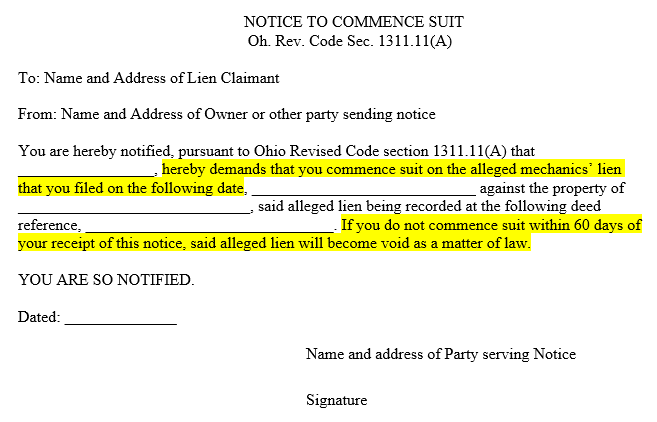You Received a Notice to Commence Suit, Now What?
Your company is furnishing to a construction project and you are a brilliant credit professional, so you gather project information and serve your preliminary notice in accordance with the state statutory guidelines. In time, you recognize timely payment is going to be an issue, so you file a mechanic’s lien. With your mechanic’s lien filed, there may be negotiations occurring including mediation, but you keep an eye on the clock for your suit deadline. Then you receive a Notice to Commence Suit. What is a Notice to Commence Suit? Should you ignore it? Should you act?
What is a Notice to Commence Suit?
In many states, the statute provides a remedy for an owner to shorten the deadline for a lien claimant to file suit: the owner can file a Notice to Commence Suit. When properly notified by an owner or the court, any lien claimant who receives said notice must proceed with suit by the deadline stated, or they will lose their lien rights.
Should I Ignore It?
Absolutely – if you want to lose your security. No, do NOT ignore the Notice to Commence Suit. The validity of your mechanic’s lien, the crux of your security, depends on whether you timely adhere to the notice.
There was a case in New York where the lien claimant had properly filed its lien for around $22K. The owner served a Notice to Commence Suit and the claimant had 30 days to make its move, but didn’t. The court held the lien claimant failed to comply with the notice and vacated its lien. You certainly don’t want to find yourself in that position… no mechanic’s lien and no money. Take swift action if you receive a Notice to Commence Suit.
So, I Should Act?
Yes, yes, yes! When a Notice to Commence Suit or a Summons and Complaint is received by your office, in response to a lien that was filed on your behalf, take immediate steps to retain the services of an attorney to protect your rights.
Do You Have an Example of a Notice to Commence Suit?
Why, of course I do. Here’s an example of a Notice to Commence Suit for the state of Ohio (highlighting added).

In fact, I even have a second example. In Georgia, the demand is called Notice of Contest of Lien, but the end result is the same — proceed with suit or lose your lien.
NOTICE OF CONTEST OF LIEN
TO: [NAME AND ADDRESS OF LIEN CLAIMANT]
YOU ARE NOTIFIED THAT THE UNDERSIGNED CONTESTS THE CLAIM OF LIEN FILED BY YOU ON ___________20__ , AND RECORDED IN BOOK __ , __ PAGE OF THE PUBLIC RECORDS OF ___________COUNTY, GEORGIA, AGAINST PROPERTY OWNED BY ___________, AND THAT THE TIME WITHIN WHICH YOU MAY COMMENCE A LIEN ACTION TO ENFORCE YOUR LIEN IS LIMITED TO 60 DAYS FROM RECEIPT OF THIS NOTICE. THIS DAY ___________OF___________ , 20 __.
THIS ABOVE-REFERENCED LIEN WILL EXPIRE AND BE VOID IF YOU DO NOT: (1) COMMENCE A LIEN ACTION FOR RECOVERY OF THE AMOUNT OF THE LIEN CLAIM PURSUANT TO O.C.G.A. SECTION 44-14-361.1 WITHIN 60 DAYS FROM RECEIPT OF THIS NOTICE; AND (2) FILE A NOTICE OF COMMENCEMENT OF LIEN ACTION WITHIN 30 DAYS OF FILING THE ABOVE-REFERENCED LIEN ACTION.
SIGNED:
(OWNER, CONTRACTOR, AGENT OR ATTORNEY)
Is a Notice to Commence Suit the Same as Summons & Complaint?
Although similar in that both documents could shorten your suit deadline, a Notice to Commence Suit is different than a Summons & Complaint. When filing suit, the plaintiff must notify all other parties with an interest in the property that an action to foreclose is being filed. This filed document is often referred to as a Summons and Complaint.
At first glance, the Summons and Complaint may cause the unwary to believe they are being sued. In actuality, the Summons and Complaint is a legal action which requires all lien claimants to join in the foreclosure action within a specific time frame, by submitting an Answer and Cross Claim.
Frequently an Answer and Cross Claim is required in as little as 20 days from receipt of the Summons and Complaint. If a lien claimant does not respond by the deadline, lien rights may be lost.
Is Suit a Frequent Occurrence in Construction Credit?
We often discuss preliminary notices and mechanic’s liens, and admittedly rarely discuss suit. Why? Because 99% of the time, serving a preliminary notice and filing a mechanic’s lien will be enough to get you paid. Less than 1% of the notices & liens you file will go to suit. However, just because suit is rare doesn’t mean it should be ignored.
Remember, if a Notice to Commence Suit or a Summons and Complaint is received by your office, take immediate steps to retain the services of an attorney to protect your rights.


